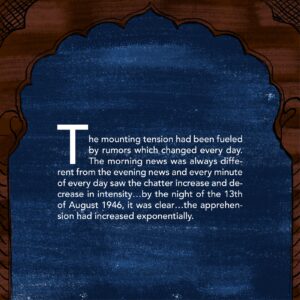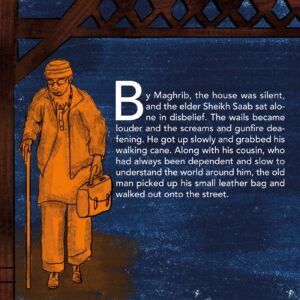The Last Train
At the end of the street there were Sikhs living in an old shanty-style house. Most of the Muslim families lived in the front end of the street and almost all were in joint family systems so that each dwelling housed over four to five clans under one roof. Living in one of the back-end houses was the local constable that had been proudly enlisted into the local police force. The ‘havildar’ was a frequent visitor to all the local homes and would participate freely in the conversations and play with the kids that roamed in the street.
The mounting tension had been fueled by rumors which changed every day. The morning news was always different from the evening news and every minute of every day saw the chatter increase and decrease in intensity. Of all the days, the days leading up to the 12th of August 1946 were the hardest.

The month began with a feeling of heaviness as most of the families would break their fast in silence and then carry on with the rest of the evening in fear and anguish. The uncertainty was what had held everyone a hostage – each family counted its members and proceeded to inquire about the safety of all the families on the street. By the days end, when all the families were safe, a tense relief flooded the night. On the night of the 13th, it was clear that there was little calm and the apprehension had increased exponentially.
It was then that the families from the central Amritsar district, Talabwala section, decided to make a move. The only resistance came from the elders who had lived their lives in the same streets that had once housed their great grandfathers. The young men rushed to gather the clothes and jewelry, placing the gold in small heaps within the pockets of their waistcoats at the bottom of the bindles. The haste and quietness through the day began to take its toll on the children who sat quietly sifting through their toys.
The havildar knocked on the gate, a light tap, and the younger brother of elderly Sheikh Saab, slowly opened the gate. The havildar was careful in speaking of the impending danger, but he was clear about the incidents that had happened and the probability that the killings would not cease. He spoke quickly in hushed whispers using as little hand gestures as possible- describing how the neighbors began pouring over walls and forcing themselves into their neighbor’s homes to kill and plunder at will while station masters and the constabulary watched. The scenes were horrific but the elder Sheikh Saab decided that they were an exaggeration and coming from a Sikh havildar not to be believed. The other members of the household stood silent but were clearly moved by the narrative and so the younger brother stood up and began to move all the members into the front courtyard. He had decided that it was time to leave.
It was mid-afternoon when the families reached the train station. The trains coming into the station were laden with bodies and body parts that leaked blood which trailed down from the cabin’s closed doors. The stench of the blood was overpowering. It was the last train to leave and all the cabins were packed with passengers. The next train would not leave for another two days- the only hope that the family had was to beg the first-class passengers for space. The younger brother pleaded and recounted all his known contacts before he was allowed to even ask a first-class passenger for space. He would later call it a miracle that he was even given an opportunity.
When space had been granted, the young men crouched on the floor of the train station so that the young kids could crawl over them into the cabins. Each family squeezed as many as members as they could knowing that anyone left behind would not make it.
By Maghrib, the house was silent and the elder Sheikh Saab sat alone in disbelief. The wails became louder and the screams and gunfire deafening. He got up slowly and grabbed his walking cane. Along with his cousin, who had always been dependent and slow to understand the world around him, the old man picked up his small leather bag and walked out onto the street. He turned around and locked his gate and then on second thought unlocked it.

He had now decided that he had to leave everything and every memory behind. The two sat in the tanga and made their way to the train station. It was on the way that the kind-hearted childishly innocent cousin lost his life- shot in the heart by an angry Sikh. The old Sheikh never revealed the story of his death, but every time he was asked his eyes would well up with tears.
As the families were boarding the last train, the old Sheikh appeared and asked his friend the British Colonel to give all the members space in the first-class cabin. The British Colonel obliged- he knew the old Sheikh Saab well.
The last train came to Lahore station on the night of the 13th August 1947. Camps had sprung up all over the city and workers helped to distribute rations. However, they were home – finally.
If you would like to learn more about the partition of India, follow the links below:
